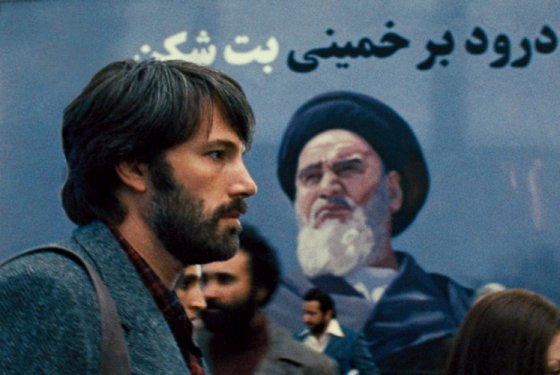[Originally published in GeneseeSun.com]
The CIA does Hollywood

Ben Affleck, “Argo”
Argo, the current film directed by and starring Ben Affleck about the 1980 Iranian hostage crisis, addresses one of the two massive foreign policy debacles of late 20th century, the other being the Vietnam War. Both episodes have their roots in the same murky cold-war era; and at this point, both are vivid examples of collective amnesia, and a virtually complete re-writing of American history. A significant part of that mind-wash happens in the cinema, sometimes with amazing rapidity. It takes less and less time for films about a war to appear after the war ends. Of course, these days wars don’t actually end, so the brainwash actually starts during the war, if not before it, which makes the cinema’s role as a propaganda machine all the more obvious.
The Vietnam War now lives in public consciousness and mythology mainly as that time when we treated our returning vets badly, and some of us tried to avoid “serving our country” (except judging from presidential politics, that second thing doesn’t seem to matter much anymore). Even among my generation, which was the most directly affected, hardly anyone even remembers the essential truth that drove all that turmoil: Vietnam was a corrupt exercise of cold-war American imperial hubris, an atrocious debacle that we had no business starting or participating in. It is no disrespect to the unfortunate American soldiers who got stuck holding the bag and paying the price to say that their leaders sent them on a fool’s, or a devil’s, errand. Sadly, the lessons that once seemed obvious have been erased, almost entirely forgotten under decades of manufactured “my country right or wrong” knee-jerk patriotism.
The current twist over the “threat” posed by Iran, a supposedly belligerent country that, unlike the U.S., has never invaded another country; whose military budget is a tiny fraction of ours; and that is almost entirely encircled by massive U.S. military forces – is only possible through the same kind of re-writing of our history with that country, which is very, very checkered indeed. Almost entirely lost to current memory is the fact that those hostages were taken in the course of a revolution in which the Iranian people overthrew a brutal dictator installed by the C.I.A. and maintained by U.S. support, who subjected the country to decades of severe repression and torture, and who then fled to a safe-harbor in the U.S. But don’t dare ask why those people hate us so much. That would be un-American.
Argo puts that year-plus long episode on the big screen just in the nick of time, and dramatizes a little-known incident that happened early in the crisis. Six Americans who had slipped out of the embassy just as it fell, and were hiding in the Canadian embassy, are rescued by the C.I.A. in a crack-pot scheme hatched by agent and “exfiltration specialist” Tony Mendez (Affleck). The group poses as a B-movie Hollywood film crew, with the ultimate plan being to slip out through intense security at the Tehran airport.
The process of setting up a fake film company seems to drag a bit, but that must be some kind of oddity of the experience of film time, because the setup phase appears to take only a few days of “real” time. The excruciating two-days training six non-actors to impersonate six other people plausibly is a solid 45 minutes of “this is never going to work.” And the final execution of the plan, leading to a hair’s breadth escape on the Tehran airport runway, is a breathtaking attempt at pulling off the impossible.
Argo is an extraordinarily good thriller, strongly acted and terrifically shot, and had me literally on the edge of my seat more completely, and for more of the running time, than any film I’ve seen in years. There’s no spoiler alert required if I say that it ends successfully, and the film concludes in the traditional Hollywood way by reuniting Affleck with his estranged wife and son.
I’m personally afraid, though, that here in 2012 America, the main residue of this film will be the numerous scenes of outraged, hateful and hate-filled Iranians, and the incredible sense of the danger faced by anyone even remotely associated with the U.S. Easily forgotten will be the crucial first five minutes of the film, which give an honest documentary-style back story that nails the horrific, conveniently forgotten period preceding the revolution, from the C.I.A. overthrow and installation of the Shah, up to the fall of the U.S. embassy. I don’t think that story is covered much in schools these days, and it’s certainly not talked about in the media today, because it doesn’t fit the popular narrative about those crazy terrorists in turbans. In the so-called liberal media, the hyped-up notion of the Iranian “threat” remains unchallenged. No better example of how it’s simply assumed to be true can be found than last week’s vice-presidential debate, where moderator Martha Radditz set up an Iran question, to unanimous agreement, by saying “there’s really no bigger national security [threat/issue] this country is facing.” Not only do we have the current reality of the issue pretty much backwards; the crucial historical context, shown in that easily forgotten first five minutes of Argo, is completely, and intentionally, missing.